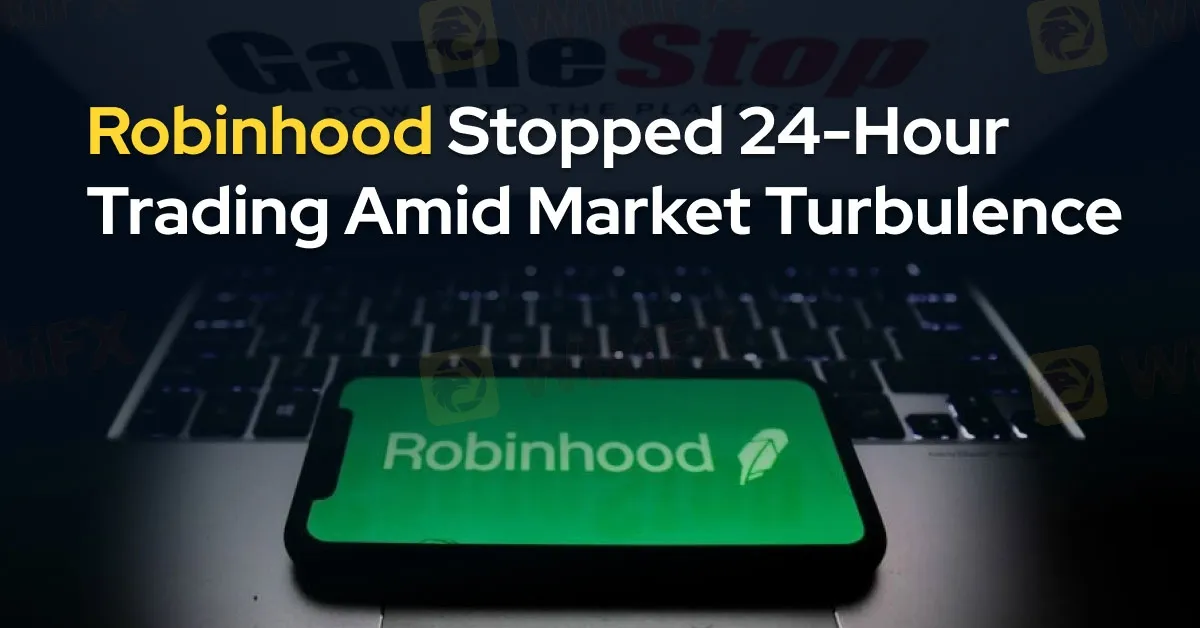简体中文
繁體中文
English
Pусский
日本語
ภาษาไทย
Tiếng Việt
Bahasa Indonesia
Español
हिन्दी
Filippiiniläinen
Français
Deutsch
Português
Türkçe
한국어
العربية
Robinhood Stopped 24-Hour Trading Amid Market Turbulence
Abstract:Robinhood announced the suspension of its 24-hour overnight trading service due to the severe market downturn on Monday, August 5.

Robinhood (NASDAQ:HOOD), a leading US neobroker, has announced the suspension of its 24-hour overnight trading service due to the severe market downturn on Monday, August 5. This service will be unavailable through Tuesday, August 6.
The market faced a steep decline on Monday, with the Dow Jones Industrial Average plummeting more than 1,000 points, a 2.6% drop. The broader S&P 500 and technology-heavy NASDAQ indices saw even sharper declines of 3.0% and 3.4%, respectively. Cryptocurrencies also took a hit, with Bitcoin and Ether prices dropping significantly.
In a statement on X (formerly Twitter), Robinhood explained that its overnight trading platform, Blue Ocean ATS (BOATs), would be offline for the night. Orders placed before approximately 8 PM ET will resume processing around 4 AM ET the following morning. Users can cancel their orders anytime and place new ones for the next trading session.

The market turmoil extended to Japan, where stocks experienced a dramatic 13% drop, the largest since the 2011 global financial crisis. This sharp sell-off led to circuit breakers being triggered across Asian exchanges. The Asia-Pacific index, excluding Japan, fell by 4.2%, while Japan's Nikkei 225 index hit a seven-month low.
In the United States, the negative trend continued with Nasdaq futures down 4.7% and S&P 500 futures plunging 12.4%. European markets were also affected, with EUROSTOXX 50 futures falling 2.1% and FTSE futures dropping 1.2%.
Investors turned to safer assets, causing both the yen and Swiss franc to strengthen. Japanese 10-year bond yields fell to 0.785%, the lowest since April, and U.S. Treasury yields also dropped significantly, with 10-year yields at 3.723% and two-year yields at 3.807%. This inversion of the yield curve is often seen as a recession indicator.
Following a disappointing July payrolls report, market expectations for Federal Reserve rate cuts have surged. Analysts now predict a 78% chance of a rate cut in September, with further reductions expected later in the year. Goldman Sachs has raised its recession probability to 25% under current conditions.
The U.S. dollar's appeal as a safe haven weakened, falling 0.4% against a basket of major currencies. It also declined against the yen and euro, while the Swiss franc appreciated. Gold prices climbed to $2,456 an ounce as investors sought refuge in precious metals.

Disclaimer:
The views in this article only represent the author's personal views, and do not constitute investment advice on this platform. This platform does not guarantee the accuracy, completeness and timeliness of the information in the article, and will not be liable for any loss caused by the use of or reliance on the information in the article.
Read more

Could U.S. Crypto Policies Trigger a Global Crisis? ECB Warns
ECB official warns U.S. crypto policies could destabilize global markets, potentially triggering the next financial crisis and threatening financial stability worldwide.

Goldman Sachs Cuts Oil Price Forecast to $65-$80 per Barrel
Goldman Sachs lowers oil price outlook to $65-$80 per barrel amid US economic slowdown, joining other banks predicting a dip in crude prices.

Filipinos Rescued from Scam Operation in Cambodia
Three Filipinos rescued from forced scam operations in Cambodia, after being deceived into working there under false promises of high salary.

Woman Loses $1.2 Million in Police Impersonation Scam
A woman falls victim to a scam where impersonators claimed to be officers from the Anti-Scam Centre, stealing $1.2 million over two months.
WikiFX Broker
Latest News
How to Avoid Risks from Scam Brokers in Forex Investment
Beware: Forex Investment Fraud Targeting Low Income Earners
Central Bank Policies,Forex Markets and Gold Prices
These 24 Crypto Scams Are Accelerating the Theft of Your Assets
49 Foreigners Arrested in Illegal POGO Raid in Pasay City
Beware of Fake 'Educational Foundations' Targeting Crypto Investors, Warns North Dakota Regulator
We Asked Grok About Illegal FX Brokers—Here’s What It Revealed
Exposing Trading Academy Scams: How Aspiring Traders are at Risk
Online Investment Scams on the Rise: How Two Victims Lost Over RM100K
Vanished Savings: How One Woman Lost RM412,443 to an Online Scam
Currency Calculator






